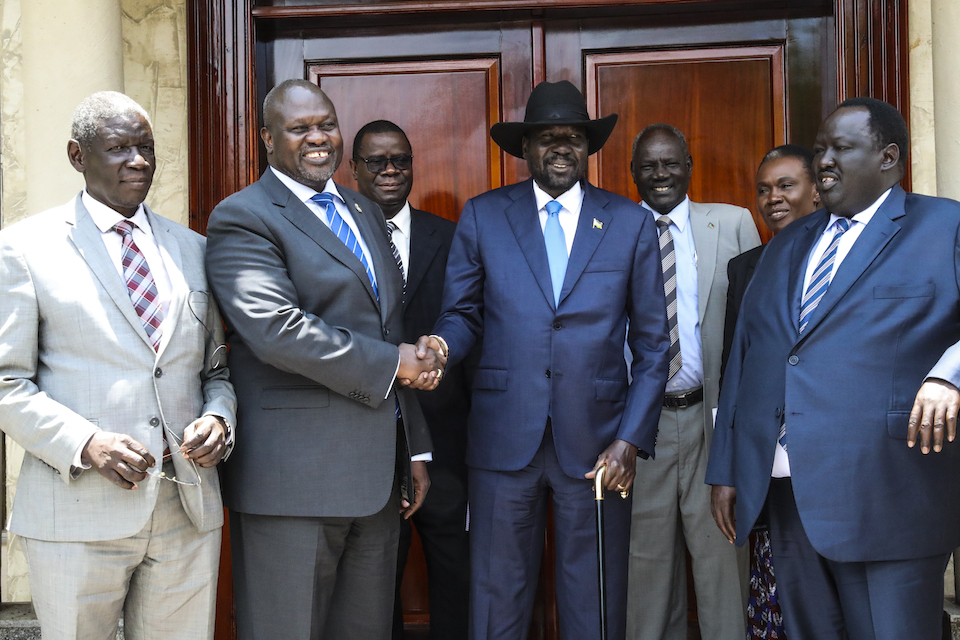Boosting the efforts of the South Sudanese people's push for peace
Statement by Ambassador Jonathan Allen, UK Deputy Permanent Representative to the UN, at the Security Council briefing on South Sudan

Thank you, Mr President.
As my colleague has just said, we very, very much welcome the meeting that took place between President Kiir and Dr Machar. This was a necessary step for the implementation of the Revitalized Agreement and for the formation of a transitional government of national unity by the already extended 12 November deadline. And I commend both men and their teams for taking that crucial step forward. It is something which gives us hope here in this Council. That November deadline is fast approaching. And so I would urge today for both parties ensure that it was just the first of many meetings going forward - and soon.
Mr President, we’ve discussed the conflict in South Sudan for some time now, and it has taken a huge toll on civilians in that country. During the worst of the conflict, we saw atrocities carried out against civilians. We saw attacks on humanitarian workers and health clinics. We saw food used and humanitarian assistance used as weapons of war. It was a grim conflict for the people of South Sudan.
And yet, since the peace agreement, I think one of the most inspiring things that I’ve seen in this Council has been the response of the people of South Sudan to that peace. People came out in their hundreds, in their thousands to celebrate and welcome the decision made by their leaders. And I really believe that the people of South Sudan have set a real example in their country, in their region and to their own leaders about the importance of peace.
So we’re very grateful to you, David, and your team for your work in facilitating reconciliation efforts, including, of course, civilian military dialogue and the peace conference taking place between states, but also, crucially, the sort of sub-national rapprochement that takes place between government and opposition. And I note from the Secretary-General’s report on future planning for protection of civilian sites, there have been at least 128 such sub-national rapprochement between the government and the opposition since the signing of the peace agreement last September. And again, this is very much to be welcomed. It’s not all about the big men meeting in choreographed ways in smoke filled rooms. Community action, grassroots reconciliation is vital and it should be encouraged by all of us, all in the region and all in South Sudan.
The UK does not yet believe that conditions in South Sudan are conducive to the safe, voluntary and dignified return of internally displaced persons and refugees. We need all parties now to play their part in establishing a secure environment for the people of South Sudan. Accountability will be a vital element of this. We urge the parties to the Revitalized Agreement to implement their commitments to establish transitional justice institutions and to sign the memorandum of understanding with the African Union to establish the hybrid court, which again, we’ve talked about in this Council for some time now, and surely it’s time now to see this coming into into place. These institutions are desperately needed. We’ve heard from the Secretary-General’s Special Representative on Sexual Violence in Conflict that reports of sexual violence increased in 2018 in an environment, I’m afraid to say, of near total impunity. The people of South Sudan need to see safety and security developing and credible action to end acts of sexual violence to ensure the protection of civilians. And they need to see the demilitarisation of towns and public buildings being taken forward.
As such, all parties to the Revitalized Agreement need to allow UNMISS and humanitarian actors to carry out their work unimpeded. A further cease fire is held, which is to be very much welcomed. A serious humanitarian crisis remains. Six and a half million people suffer food insecurity; 1.7 million are on the edge of famine. The UK remains one of the largest donors in South Sudan; we spend with $135 million in this financial year. That’s our national contribution. We give more through the European Union and through development assistance. And we remain committed to the people and the country. But all humanitarian actors must be able to play their part in helping the people of South Sudan to rebuild their country.
Mr President, there will be many more opportunities for dialogue between now and November. And we urge the parties to continue to meet, for the region to retain its focus on South Sudan, and we really hope the ministers from EGAD will be able to meet before November. And as my colleague from the United States has said, this council will have an important opportunity to engage with the parties in a visit to Juba in late October, co-led, I believe by our South African presidency. I hope that then we will have an opportunity to meet with all the parties to the Revitalized Agreement.
I hope we will able to meet representatives of women and youth and other civil society reps. I hope we’ll be able to see grass roots reconciliation happening. I know the church had been involved in this. I know there are other actors involved. I think we could really have a great opportunity to, as a council, to give a timely boost to the efforts of the South Sudanese parties and people. And that is how it should be, of course.
Thank you, Mr President.